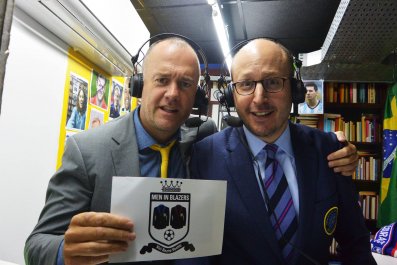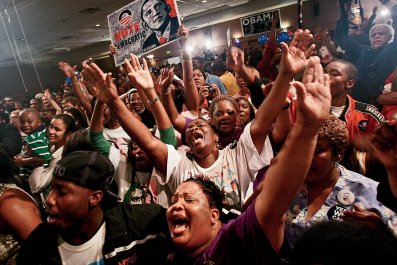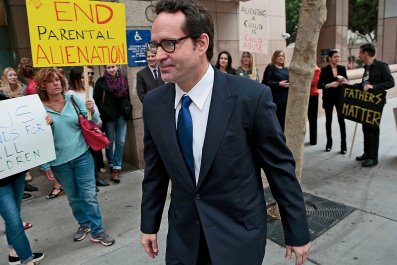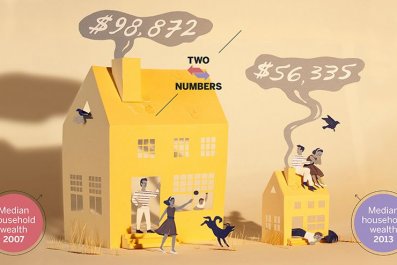The USA showed plenty of passion on the pitch during the World Cup – and there was plenty off it, too. At times, it threatened to turn nasty as the success of the team divided Americans over the merits of an alien game that might not be quite so alien ever again.
Political and cultural fissures were exposed in a land where football is traditionally played by men in padded shirts and helmets – and which stops every few minutes for a commercial break.
Ann Coulter, a card-carrying soccer basher and conservative columnist, set off a firestorm with an article headlined: "America's Favourite National Pastime: Hating Soccer" – and was savaged on social media as a result.
Then Sean Hannity, of Fox News, waded in by saying that soccer was boring, while others branded the world's most popular game as a liberal invention that smacks of socialism and is mainly played by immigrants, possibly some of them living illegally in the country.
"Soccer fever hits fever pitch," blared a headline in USA Today. And, for a moment, the country was truly infected as millions bunked off work and gathered in their thousands to watch the games.
America lost to Belgium in the round of 16 but the bandwagon kept rolling and now it has been suggested – and in no way refuted by the US Soccer Federation – that the United States could come to Fifa's rescue by staging the 2022 World Cup in the event of the tournament being taken away from Qatar following claims that the Gulf state was involved in a corrupt bidding process.
America already has the stadiums; five out of 14 international sponsors and partners in Brazil 2014 were American companies and more World Cup tickets were sold to Americans than any other country apart from the hosts.
"What we see in the United States is staggering," said Jerome Valcke, Fifa's Secretary General. "The country has the largest level of youth soccer in the world, with 20 million young people playing and there is a commitment from Fifa to work with US soccer."
Despite some conservatives' protestations, America's growing love of soccer is beyond doubt. President Obama, who calls himself a "soccer dad", has assumed the role of cheerleader-in-chief and even went as far as speaking on the telephone to the USA's captain and goalkeeper shortly before the Belgium game.
This riled some of his political opponents, who saw the World Cup as a diversion from the president's woeful ratings in the opinion polls.
Coulter has gone further, saying the growth of soccer is "a sign of the nation's moral decay", a socialist sport where "individual achievement is not a big factor" and where in some countries the losing fans go on the rampage, fuelled by drink and tribal hatred. However, Stan Veuger, an economics scholar at the American Enterprise Institute, a conservative think-tank, has broken ranks with his right-wing colleagues.
"Soccer is certainly not a socialist sport when it comes to its industrial organisation," he says. "Unlike the NFL [National Football League], it is not a cesspit of bailouts, revenue sharing, or affirmative action for underperformers."
The soccer fraternity in America argues that the game is in fact more cut-throat capitalist than any other professional American sport. Under-performing soccer teams in Europe get relegated at the end of each season and lose -millions of dollars in the process, whereas the concept of relegation in America is laughable.
The Washington Redskins of the NFL may lose every game in a season but they have no fear of being demoted. And the weak teams in the NFL are rewarded through the popular draft system, whereby they get the first picks of the top graduating college players.
The NFL draft, loved by conservatives and liberals alike, is actually "un-American", notes political scientist Dominic Tierney in The Atlantic: "If Obama announced that the top medical school graduate would be forced to work in the worst hospital in the country, people would be outraged."
America's soccer league is called Major League Soccer and was founded in 1996. All its players, except a few designated stars, are centrally owned and paid by the league, and a salary cap exists in order to create parity.
What's more, it's not liberals, but America's biggest conservative capitalists who have been the engine behind soccer's growth.
Rupert Murdoch, the media mogul, has spent $600 million for the rights to the 2018 and 2022 World Cups. And arch-conservative Philip Anschutz, owner of the neoconservative flagship magazine, The Weekly Standard, helped found MLS and once owned six teams in the league.
It was Anschutz who stunned the soccer world when he signed David Beckham to Los Angeles Galaxy in 2007 on a five-year, $250 million deal. Things have never been the same since.
The "Beckham effect" was far-reaching. He, and his pop-star wife, Victoria, made soccer -fashionable. Tom Cruise turned up at games.
Beckham is currently in negotiations to start his own team in Miami and MLS has almost -doubled in size since its early days.
The league will have 21 teams next year. Orlando City Soccer Club will introduce Brazil's Kaka, and the Manchester City-funded New York City FC, will roll out Spain's David Villa, and, perhaps, the former Chelsea player, Frank Lampard. Already, the Seattle Sounders average more than 44,000 for their home games.
While there are shrill voices who see soccer as a plot to change the natural order, denouncing the game in America is fast becoming old--fashioned – a minority sport, even.
Once upon a time, soccer was all about "soccer moms" – white middle-class housewives – who ferried their children to practice in mini-vans. Now it touches all levels of society and, crucially, all kinds of voters.
As one of the BBC commentators put it after the USA lost narrowly to Belgium in extra time. "This is a proper team with proper fans. They get it."
The one consolation for those Americans who still see soccer as a threat is that the World Cup only comes around every four years.






























